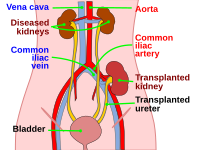
Photo from wikipedia
BACKGROUND Approximately 1700 children per year with end-stage kidney disease undergo kidney transplantation in Europe and the United States of America; 30%-50% are living donor kidney transplantations. There may be… Click to show full abstract
BACKGROUND Approximately 1700 children per year with end-stage kidney disease undergo kidney transplantation in Europe and the United States of America; 30%-50% are living donor kidney transplantations. There may be immunological differences between paternal and maternal donors due to transplacental exchange of cells between the mother and fetus during pregnancy leading to microchimerism. We investigated whether the outcome of living-related kidney transplantation in young children is different after maternal compared with paternal organ donation. METHODS Using the international Collaborative Transplant Study (CTS) database, we analyzed epidemiological data of 7247 children and adolescents aged <18 years who had received a kidney transplant from either mother or father. Risk of treated rejection episodes and death-censored graft failure were computed using the Kaplan-Meier method and multivariable Cox regression. RESULTS In the recipient age group 1-4 years, the rate of treated rejection episodes in recipients of kidneys from maternal donors (N = 195) during the first 2 years post-transplant was significantly lower (hazard ratio HR = 0.47, p = .004) than in patients receiving kidneys from paternal donors (N = 179). This association between donor sex and risk of treated rejections was not observed in children aged 5-9 years. The 5-year death-censored graft survival in children aged 1-4 years with a maternal or paternal donor was comparable. CONCLUSIONS Maternal kidney donation in young pediatric renal transplant recipients is associated with an approximately 50% lower rate of treated rejection than paternal kidney donation. Whether this phenomenon is due to maternal microchimerism-induced donor-specific hyporesponsiveness must be evaluated in prospective mechanistic studies.
Journal Title: Pediatric transplantation
Year Published: 2021
Link to full text (if available)
Share on Social Media: Sign Up to like & get
recommendations!